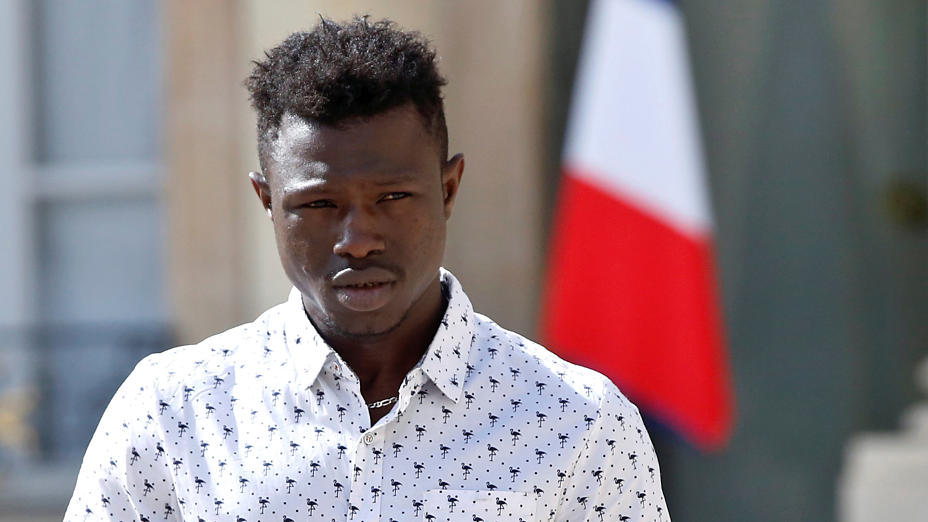Last month, viewers around the world watched in disbelief as Mamoudou Gassama, 22, scaled a Parisian apartment building to lift a young boy to safety, an act executed with such breathtaking speed and precision that it earnt him the moniker ‘Spider-man of the 18th [arrondissement].’
Gassama, who is originally from Mali, was invited to meet with French President Emmanuel Macron, during which he was awarded a medal for courage and swiftly honoured with French citizenship.
What Gassama did was remarkable. But arguably more remarkable is the way in which many of us in the West reacted to the event.
Footage of the event went viral, and swathes of commenters gushed that Gassama’s French citizenship was “well-deserved”. Others remarked that he had “earnt it”.
But is this what it takes to ‘earn’ your place in French society as an immigrant? An act so exceptional that it draws comparisons to spider-man, a literal superhero boasting superhuman powers?
In some ways, it’s hard to imagine that the deluge of praise heaped on Gassama could offer anything but goodwill to migrants in general. But the ‘exceptional immigrant’ narrative can be insidious in what it implies.
Comedian Aamer Rahman flagged the tendency that many of us in the West have to hold migrants and immigrants to a radically different standard to that of ‘local’ populations, tweeting “….watch as this gets used as an example of the standard people must demonstrate to ‘deserve’ citizenship”.
I’m happy but watch as this gets used as an example of the standard people must demonstrate to ‘deserve’ citizenship https://t.co/qYbqhXSREx
— Aamer Rahman (@aamer_rahman) May 28, 2018
British-Asian author Nikesh Shukla drew attention to this phenomenon in The Good Immigrant, a collection of essays that hit shelves in 2016. In the preface, Shukla proffers that:
…the biggest burden facing people of colour in this country is that society deems us bad immigrants—job-stealers, benefit-scroungers, girlfriend-thieves, refugees—until we cross over in their consciousness, through popular culture…to become good immigrants. And we are so tired of that burden.
That is, as immigrants, or indeed locally-born people of colour, we aren’t seen as human by default in the way that white locals are. Instead, our humanity must be earnt. As Shukla remarked in an interview for Vice Magazine: “we’re all bad immigrants until we prove ourselves otherwise”.
This same narrative is rife in Australian discourse. For example, you may have heard of Dr. Munjed Al Muderis, a high-profile surgeon who arrived in Australia as a refugee in 1999. Al Muderis famously pioneered a form of osseointegration surgery which allows amputees to walk. One of his patients made headlines a couple of years ago when she urged the Prime Minister to give asylum seekers the right to obtain a visa, on the basis that she benefited hugely from Al Muderis’ expertise.
While her plea was clearly borne of gratitude and the very best of intentions, it was steeped in the ‘exceptional immigrant’ narrative—refugees should be allowed to settle in Australia because they might just save an Aussie’s life.
The implication here is that immigrants must always ‘contribute’ to a country; they must be valuable enough earn their keep. You’d be hard-pressed to see the same degree of martyrdom demanded of the local white population.
Expecting migrants and immigrants to be exceptional while the ‘local’ population is perfectly welcome to traffic in mediocrity establishes a power relation between ‘local’ and immigrant populations, an imbalance that further opens the door to discrimination and racism while reaffirming existing prejudices.
American entrepreneur Anil Dash speaks back to the ‘exceptional immigrant’ narrative in the following tweet:
I’m in favour of immigrants who come to America to not do anything remarkable, who just hang out & sometimes spend time with their friends and family, who are flawed and regular people. I’m in favour of immigrants who don’t have to be superheroic or economic martyrs to justify access.
The ‘exceptional immigrant’ narrative implies that the dignity and humanity of migrants, immigrants and non-white locals is conditional. But true equality is not having a prove yourself as worthy of the ground you walk on. It is the right to just be as unremarkable as the guy who just happened to be born in France, or England, or Australia, and nothing to ‘deserve’ it.
About the author
Reena Gupta is a Melbourne-based freelance writer of South Asian heritage. Her work has appeared in New Matilda, Overland and Medium, and she can be tweeted at @purpletank.



